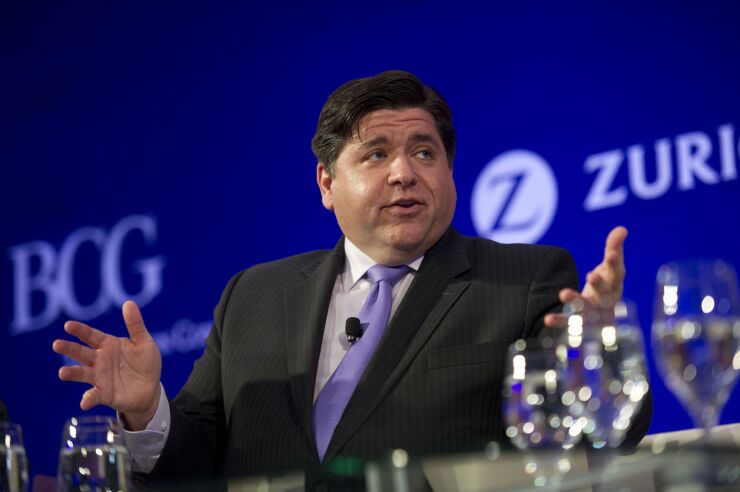Illinois Gov. J.B. Pritzker’s administration named 36 firms to newly minted
The state named 18 firms to the senior manager list it will use to form syndicates and 18 firms to the co-manager pool.

Four firms qualify as minority- or woman-owned majority businesses in the senior pool. In the co-manager pool, 11 firms qualify as minority-owned businesses and four are designated as veteran-owned businesses with one firm –Academy Securities – meeting the criteria for both designations.
Capital borrowing is expected to pick up under the six-year, $45 billion Rebuild Illinois capital program passed last spring. It authorized $22.6 billion of new money borrowing under the state’s GO credit and sales tax-backed Build Illinois program.
The state expects to issue $2.1 billion of general obligation bonds and $250 million of sales-tax backed Build Illinois bonds in fiscal 2021, according to budget documents. The new-money debt would fund projects in the fiscal 2021 $3.6 billion capital program that’s part of the $45 billion infrastructure plan.
The state also has authorization to sell about $1.2 billion of bill backlog GO bonds. It also has authority about $700 million of unused bonding authority from a $1 billion authorization to pay for an ongoing pension buyout plan and $1.2 billion to pay down the backlog.
State budget officials did not have an update on the timing of sales and it’s unclear whether the fiscal toll of COVID-19 on state tax revenues and spending demands will influence the timing of sales. The state has not tapped the backlog borrowing authorization, which would be used if overdue bills that carry top interest rates mount.
The bill backlog currently stands at $8 billion and could rise as the state incurs bills related to COVID-19 purchases or for residential or business relief. The administration is weighing pushing off the April income tax deadline but that would delay the receipt of more than $1 billion in revenues.
Gambling expansion revenues and a hike in motor fuel taxes are earmarked for the new capital budget but casinos and other institutions that host gambling are shuttered under a state stay at home order and motor fuel use is down with most businesses closed and leisure activities limited.
Eight firms that submitted a proposal to participate in the pools were not selected. The initial term will run for four years with the potential to renew the term for a total of up to 10 years.
The state said in the RFQ it intended to pick up to 15 firms for inclusion in each pool but ended up going with a larger number. The previous senior manager pool included 15 firms.
The senior pool is: Bank of America Securities; Barclays Cabrera Capital Markets; Citigroup Global Markets; Goldman Sachs & Co.; Jefferies LLC; JP Morgan; Loop Capital Markets; Mesirow Financial; Morgan Stanley & Co.; Piper Sandler & Co.; PNC Capital Markets; Ramirez & Co.; RBC Capital Markets; Siebert Williams Shank; Stifel, Nicolaus & Co.; UBS Financial Services; and Wells Fargo Co.
The co-manager pool is Academy Securities; Backstrom, McCarley, Berry; Bancroft Capital LLC; Blaylock Van LLC; Drexel Hamilton LLC; Estrada Hinojosa Investment Bankers; Fifth Third Bank; Harvestons Securities; Hutchinson, Shockey, Erley & Co.; Janney, Montgomery, Scott; Melvin Securities; Mischler Financial Group; North South Capital; Podesta & Co.; Raymond James & Associates; Rice Financial; Stern Brothers & Co.; and Valdes & Moreno.
The pools replace those established in 2016, which ran for a three-year term that expired last September. Gov. J.B. Pritzker’s administration extended the term for six months as permitted under the procurement process. The new pools allow the governor’s administration to put its stamp on the state’s banker relationships as Pritzker hits his first anniversary in office.
The RFQ closed Jan. 23.
The state uses a mix of competitive and negotiated sales to issue its sales-tax backed Build Illinois and general obligation borrowing with statutes requiring that at least 25% of GOs be sold competitively in a fiscal year.
As Illinois pays the widest spread penalty among states for its status as the lowest rated state, the mixed sale types have helped the state keep borrowing costs in check. That’s because underwriters have incentive to submit highly competitive bids in hopes of gaining the administration’s favor in the selection of teams for negotiated issuance.





